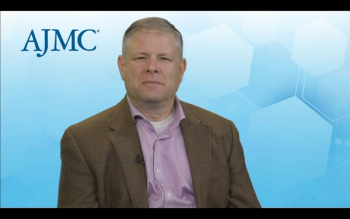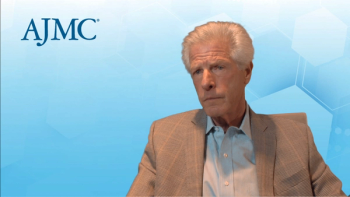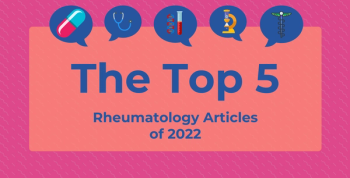
Dennis Scanlon, PhD, professor of health policy and administration at the Pennsylvania State University, discusses how extra benefit coverage and the choice to shop for plan options are some factors driving Medicare Advantage (MA) program growth.

Dennis Scanlon, PhD, professor of health policy and administration at the Pennsylvania State University, discusses how extra benefit coverage and the choice to shop for plan options are some factors driving Medicare Advantage (MA) program growth.

An area of the brain that contributes to cough suppression was found to be smaller in volume in adults with chronic cough than those without, demonstrating a possible connection between brain structure changes and cough hypersensitivity.

Dennis Scanlon, PhD, professor of health policy and administration at the Pennsylvania State University, discusses some of the reasoning behind Part D benefits changes in the Inflation Reduction Act (IRA) and the cost questions that remain.

Dennis Scanlon, PhD, professor of health policy and administration at the Pennsylvania State University, talks about how it will take time to understand the full effect of the Inflation Reduction Act (IRA) provision allowing Medicare to negotiate drug prices with companies.

A study of patients hospitalized for chronic obstructive pulmonary disease (COPD) exacerbation found that exclusively using the population-based Hospital Frailty Risk Score tool to assess for frailty may cause it to go undetected and untreated.

Telemonitoring may help improve continuous positive airway pressure (CPAP) therapy adherence for patients with obstructive sleep apnea syndrome (OSA), while motivational enhancement therapy (MET) most significantly impacted long-term adherence, according to a recent study.

At the start of the COVID-19 pandemic, high levels of distress, overwhelm with daily problems, and unmet psychosocial information needs decreased caregiver-reported health-related quality of life in children with rare diseases.

With the public health emergency soon coming to an end, people covered by Medicaid will encounter new barriers, discusses Dennis Scanlon, PhD, professor of health policy and administration, Penn State University.

Behavioral and combined behavioral and pharmacological interventions were investigated for their potential to help improve sleep outcomes in children with attention-deficit/hyperactivity disorder (ADHD).

The United States possesses the highest infant and maternal mortality rates compared with any other high-income country, even though it spends the most on health care.

Mindfulness training may boost resilience and lessen morbidities for people with Parkinson disease, compared with conventional exercise.

Health care costs in the United States for respiratory conditions have increased from 1996 to 2016, particularly for chronic conditions like chronic obstructive pulmonary disease (COPD) and asthma.

Certain variables have been shown to have both positive and negative influences on the willingness to pay for sleep disturbance treatment, such as wealth, insurance coverage, quality of life, and age.

Big data has valuable implications for analyzing datasets and in day-to-day clinical practice, explained Ken Cohen, MD, director of translational research for Optum Care.

Having worse sleep is linked with the greatest gain in sleeping longer after treatment with cognitive behavioral therapy for insomnia (CBT-I), according to a recent study.

Patient quality of life can be improved through shared knowledge between doctors and patients in cancer care using the Cancer and Aging Research Group (CARG) Chemotherapy Toxicity Tool calculator, which Rocky Mountain Cancer Centers piloted, explained Alonso V. Pacheco, MD, medical director and medical oncologist/hematologist, Rocky Mountain Cancer Centers.

Patients with higher health literacy and access to resources to self-advocate are more likely to benefit from health care consolidation, discussed Susan Sabo-Wagner, MSN, RN, OCN, executive director of clinical strategy for Oncology Consultants of Houston, Texas.

Ken Cohen, MD, director of translational research for Optum Care, talks about the value of prior authorizations in different contexts, and how simplicity can benefit the process in some situations.

New immunotherapies are changing the shape of oncology care, but there is also a need for a system that provides these high-quality therapies to the patients most likely to benefit from them. This might mean doing an assessment and a deeper dive into patient functional status, says Alonso V. Pacheco, MD, medical director and medical oncologist/hematologist, Rocky Mountain Cancer Centers.

Access to electronic health information can be improved through provider assistance for optimal use of a patient portal.

Most influencers on YouTube are promoting the discontinuation of hormonal birth control and promoting inaccurate medical information, according to a recent study.

Susan Sabo-Wagner MSN, RN, OCN, executive director of clinical strategy for Oncology Consultants of Houston, Texas, explained how cultural competency allows for better care delivery to patients with cancer.

Initiatives to address social determinants of health are likely to positively change the health care landscape, and better patient education can contribute to more favorable care choices says Ken Cohen, MD, director of translational research for Optum Care.

A tool to measure chemotherapy toxicity from the Cancer and Aging Research Group can help determine emergency department visits or hospitalization risk, especially for elderly patients, says Alonso V. Pacheco, MD, medical director and medical oncologist/hematologist, Rocky Mountain Cancer Centers.

Creating new incentive models and transparently sharing data in a way that changes behaviors are 2 ways to reduce low-value care in the health care system, explains Ken Cohen, MD, director of translational research for Optum Care.

New research shows that factors such as work and childcare contribute to less sleep in midlife, with these new study findings aligning with previous data.

Moving screening and prevention care more upstream can help make an impact by getting patients diagnosed with cancer earlier, said Susan Sabo-Wagner, MSN, RN, OCN, executive director of clinical strategy for Oncology Consultants of Houston, Texas.

Ken Cohen, MD, director of translational research for Optum Care, speaks on the future of more biosimilars hitting the market, and how they will influence value-based care.

In the last 2 years, half of women reported needing mental health services compared with only 35% of men. Women who needed mental health care cited provider availability and cost, especially for those who are uninsured, to be 2 major barriers to receiving care.

The top 5 most-read rheumatology articles of 2022 covered the topics of management of inflammatory arthritis and new inflammatory protein identification.

259 Prospect Plains Rd, Bldg H
Cranbury, NJ 08512
© 2025 MJH Life Sciences®
All rights reserved.
